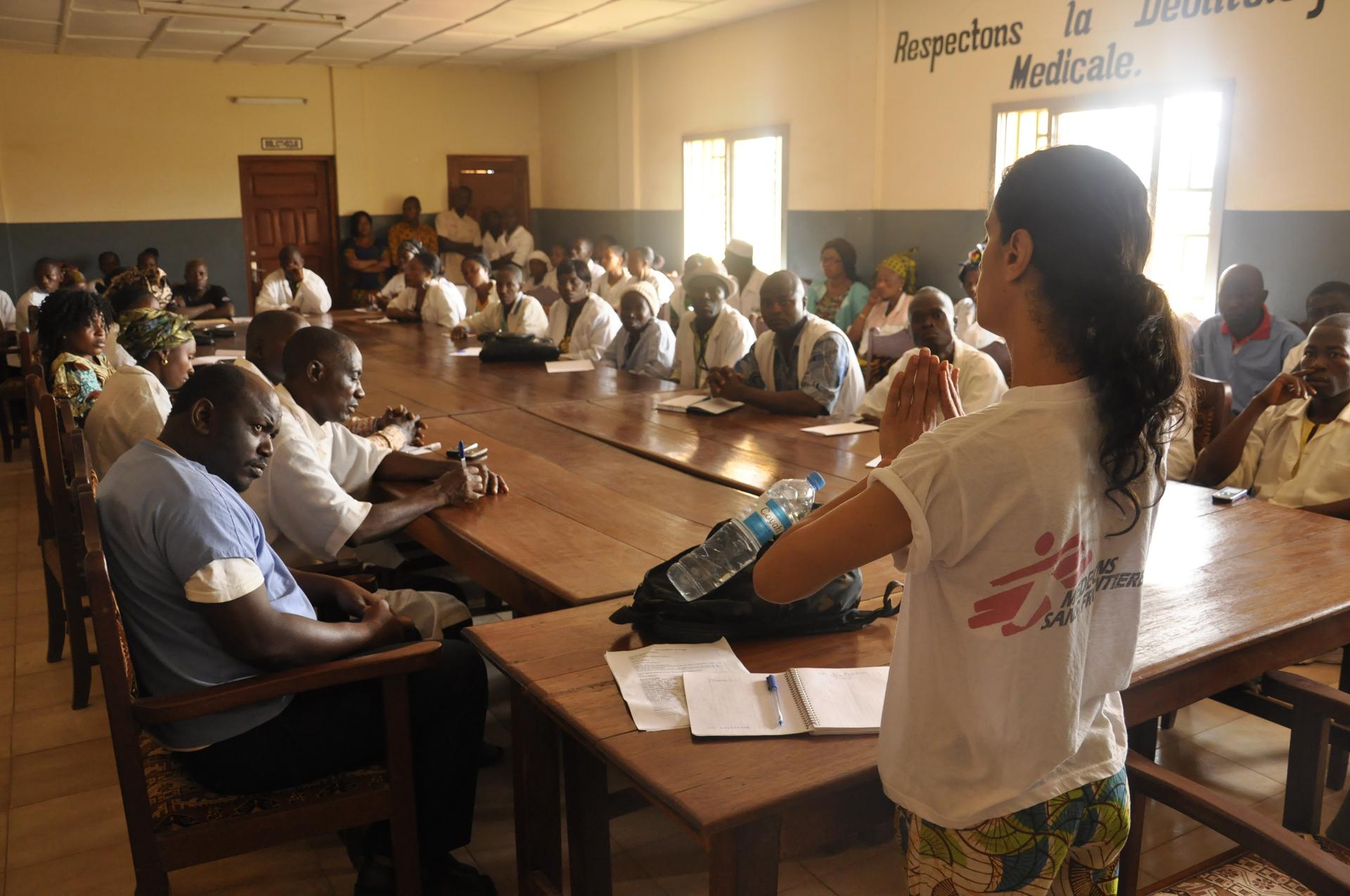Nurse Monia Sayah of Doctors Without Borders explains how the Ebola virus is transmitted to a hospital medical team in Guéckédou, Guinea.
Sasobas Temé Sadnou has been to the edge of hell and back.
Earlier this year, the Guinea resident tested positive for Ebola. "Before the outbreak was official, Sasobas cared for a person that was sick with Ebola," said Monia Sayah, a nurse with Doctors Without Borders, the NGO also known by its French name, Médecins Sans Frontières. "The sick person said that he didn't want any members of his family to care for him. But Sasobas, a friend of his, said, 'I will stay with you, and I will care for you.' So he did stay with this man knowing that he was taking huge amounts of risk."
But Sasobas beat the odds. He joined a handful of Guineans who have recovered from Ebola during the current outbreak. No one knows why Sasobas survived, but he did seek early treatment, which MSF says can boost a patient's chances.
"The gentleman died and Sasobas became sick. And he actually walked with another colleague of his to the treatment facility that we had set up, and was just lying on a bench outside. Somebody called me and said, 'You really need to bring him in.' And I said, 'Well I need to speak with him first.' And then they told me the story quickly. And I said, 'Okay let's get dressed and we'll bring you in.'
"I remember taking his blood, and I also remember that same day going in and telling him that it was positive and that he needed to go into the confirmed area. And Sasobas was very, very sick. And for a few days I was quite concerned — we thought that we were going to lose him. He refused to talk, to eat. He was just very withdrawn."
"And suddenly he got better. And he told us that during those two days he was giving up. But he said that because we were on him all the time, saying, 'You really need to eat, and we'll give you an intervenous fluid if you don't,' he felt that he was well taken care of and he survived."
"After that he came to visit us every day and he was actually hired by the Guinean Red Cross to be a spokesperson and really to sensitize the population and explain to them 'This is what's going on in the facility.' Often the communities distrust what people tell them, and he could say to them, 'You cannot tell me it's not true, because I was there. I almost died and I survived.'"
"So a wonderful, very strong person."
Sasobas Temé Sadnou has been to the edge of hell and back.
Earlier this year, the Guinea resident tested positive for Ebola. "Before the outbreak was official, Sasobas cared for a person that was sick with Ebola," said Monia Sayah, a nurse with Doctors Without Borders, the NGO also known by its French name, Médecins Sans Frontières. "The sick person said that he didn't want any members of his family to care for him. But Sasobas, a friend of his, said, 'I will stay with you, and I will care for you.' So he did stay with this man knowing that he was taking huge amounts of risk."
But Sasobas beat the odds. He joined a handful of Guineans who have recovered from Ebola during the current outbreak. No one knows why Sasobas survived, but he did seek early treatment, which MSF says can boost a patient's chances.
"The gentleman died and Sasobas became sick. And he actually walked with another colleague of his to the treatment facility that we had set up, and was just lying on a bench outside. Somebody called me and said, 'You really need to bring him in.' And I said, 'Well I need to speak with him first.' And then they told me the story quickly. And I said, 'Okay let's get dressed and we'll bring you in.'
"I remember taking his blood, and I also remember that same day going in and telling him that it was positive and that he needed to go into the confirmed area. And Sasobas was very, very sick. And for a few days I was quite concerned — we thought that we were going to lose him. He refused to talk, to eat. He was just very withdrawn."
"And suddenly he got better. And he told us that during those two days he was giving up. But he said that because we were on him all the time, saying, 'You really need to eat, and we'll give you an intervenous fluid if you don't,' he felt that he was well taken care of and he survived."
"After that he came to visit us every day and he was actually hired by the Guinean Red Cross to be a spokesperson and really to sensitize the population and explain to them 'This is what's going on in the facility.' Often the communities distrust what people tell them, and he could say to them, 'You cannot tell me it's not true, because I was there. I almost died and I survived.'"
"So a wonderful, very strong person."
We want to hear your feedback so we can keep improving our website, theworld.org. Please fill out this quick survey and let us know your thoughts (your answers will be anonymous). Thanks for your time!
